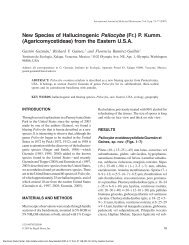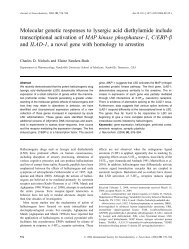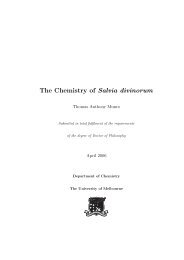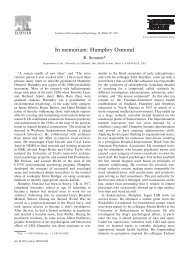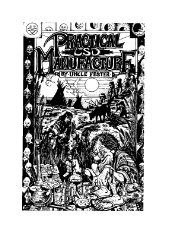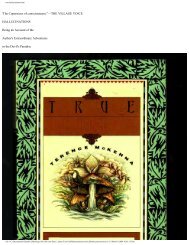- Page 1 and 2:
The Salvia divinorum Research and I
- Page 3 and 4:
The Salvia divinorum Research and I
- Page 5 and 6:
The Salvia divinorum Research and I
- Page 7 and 8:
Daniel J Siebert's Home Page analog
- Page 9 and 10:
type_Document_Title_here A Salvia d
- Page 11 and 12:
Molecular Model of Salvinorin A Sal
- Page 13 and 14:
type_Document_Title_here The coroll
- Page 15 and 16:
Sage Wisdom Salvia Shop Sales Polic
- Page 17 and 18:
Salvia divinorum workshops, lecture
- Page 19 and 20:
The Salvia divinorum FAQ I. ACKNOWL
- Page 21 and 22:
The Salvia divinorum FAQ This docum
- Page 23 and 24:
The Salvia divinorum FAQ Q. Salvino
- Page 25 and 26:
The Salvia divinorum FAQ Level - 4
- Page 27 and 28:
The Salvia divinorum FAQ in a 360 d
- Page 29 and 30:
The Salvia divinorum FAQ are ready,
- Page 31 and 32:
The Salvia divinorum FAQ A. Within
- Page 33 and 34:
The Salvia divinorum FAQ on a couch
- Page 35 and 36:
The Salvia divinorum FAQ VII. THE P
- Page 37 and 38:
The Salvia divinorum FAQ A. Salvia
- Page 39 and 40:
The Salvia divinorum FAQ IX. SALVIA
- Page 41 and 42:
The Salvia divinorum FAQ Attempts t
- Page 43 and 44:
The Salvia divinorum FAQ Q. Is Salv
- Page 45 and 46:
The Salvia divinorum FAQ trip, you'
- Page 47 and 48:
The Salvia divinorum FAQ Drying is
- Page 49 and 50:
The Salvia divinorum FAQ • Salvia
- Page 51 and 52:
The Salvia divinorum FAQ before, fi
- Page 53 and 54:
The Salvia divinorum FAQ lighting.
- Page 55 and 56:
The Salvia divinorum FAQ http://www
- Page 57 and 58:
http://www.sagewisdom.org/usersguid
- Page 59 and 60:
http://www.sagewisdom.org/usersguid
- Page 61 and 62:
http://www.sagewisdom.org/usersguid
- Page 63 and 64:
http://www.sagewisdom.org/usersguid
- Page 65 and 66:
http://www.sagewisdom.org/usersguid
- Page 67 and 68:
http://www.sagewisdom.org/usersguid
- Page 69 and 70:
http://www.sagewisdom.org/usersguid
- Page 71 and 72:
http://www.sagewisdom.org/usersguid
- Page 73 and 74:
http://www.sagewisdom.org/usersguid
- Page 75 and 76:
Saturday, November 4, 2000 Salvia d
- Page 77 and 78:
Saturday, November 4, 2000 Salvia d
- Page 79 and 80:
Saturday, November 4, 2000 Salvia d
- Page 81 and 82:
Saturday, November 4, 2000 Salvia d
- Page 83 and 84:
Adobe Acrobat Reader - Download ●
- Page 85 and 86:
LE GUIDE D'UTILISATION DE LA SALVIA
- Page 87 and 88:
LE GUIDE D'UTILISATION DE LA SALVIA
- Page 89 and 90:
LE GUIDE D'UTILISATION DE LA SALVIA
- Page 91 and 92:
LE GUIDE D'UTILISATION DE LA SALVIA
- Page 93 and 94:
LE GUIDE D'UTILISATION DE LA SALVIA
- Page 95 and 96:
LE GUIDE D'UTILISATION DE LA SALVIA
- Page 97 and 98:
LE GUIDE D'UTILISATION DE LA SALVIA
- Page 99 and 100:
LE GUIDE D'UTILISATION DE LA SALVIA
- Page 101 and 102:
LE GUIDE D'UTILISATION DE LA SALVIA
- Page 103 and 104:
LE GUIDE D'UTILISATION DE LA SALVIA
- Page 105 and 106:
LE GUIDE D'UTILISATION DE LA SALVIA
- Page 107 and 108:
LE GUIDE D'UTILISATION DE LA SALVIA
- Page 109 and 110:
LE GUIDE D'UTILISATION DE LA SALVIA
- Page 111 and 112:
LA GUIA DE USUARIOS DE SALVIA DIVIN
- Page 113 and 114:
LA GUIA DE USUARIOS DE SALVIA DIVIN
- Page 115 and 116:
LA GUIA DE USUARIOS DE SALVIA DIVIN
- Page 117 and 118:
LA GUIA DE USUARIOS DE SALVIA DIVIN
- Page 119 and 120:
LA GUIA DE USUARIOS DE SALVIA DIVIN
- Page 121 and 122:
LA GUIA DE USUARIOS DE SALVIA DIVIN
- Page 123 and 124:
LA GUIA DE USUARIOS DE SALVIA DIVIN
- Page 125 and 126:
LA GUIA DE USUARIOS DE SALVIA DIVIN
- Page 127 and 128:
LA GUIA DE USUARIOS DE SALVIA DIVIN
- Page 129 and 130:
LA GUIA DE USUARIOS DE SALVIA DIVIN
- Page 131 and 132:
LA GUIA DE USUARIOS DE SALVIA DIVIN
- Page 133 and 134:
LA GUIA DE USUARIOS DE SALVIA DIVIN
- Page 135 and 136:
La guida per l’uso di Salvia divi
- Page 137 and 138:
La guida per l’uso di Salvia divi
- Page 139 and 140:
La guida per l’uso di Salvia divi
- Page 141 and 142:
La guida per l’uso di Salvia divi
- Page 143 and 144:
La guida per l’uso di Salvia divi
- Page 145 and 146:
La guida per l’uso di Salvia divi
- Page 147 and 148:
La guida per l’uso di Salvia divi
- Page 149 and 150:
La guida per l’uso di Salvia divi
- Page 151 and 152:
How to achieve effects from smoked
- Page 153 and 154:
What's New in the World of Salvia d
- Page 155 and 156:
What's New in the World of Salvia d
- Page 157 and 158:
Salvia divinorum. Cultivation and p
- Page 159 and 160:
Salvia divinorum experiences The Fo
- Page 161 and 162:
Dale Pendell: Salvia divinorum Salv
- Page 163 and 164:
Dale Pendell: Salvia divinorum ghos
- Page 165 and 166:
Dale Pendell: Salvia divinorum year
- Page 167 and 168:
Dale Pendell: Salvia divinorum The
- Page 169 and 170:
Dale Pendell: Salvia divinorum Smok
- Page 171 and 172:
Dale Pendell: Salvia divinorum Body
- Page 173 and 174:
Dale Pendell: Salvia divinorum The
- Page 175 and 176:
Dale Pendell: Salvia divinorum The
- Page 177 and 178:
Dale Pendell: Salvia divinorum narr
- Page 179 and 180:
Dale Pendell: Salvia divinorum Sign
- Page 181 and 182:
Dale Pendell: Salvia divinorum with
- Page 183 and 184:
Dale Pendell: Salvia divinorum Afte
- Page 185 and 186:
Dale Pendell: Salvia divinorum Ott,
- Page 187 and 188:
Pharmako/poeia Pharmako/poeia Il ca
- Page 189 and 190:
Pharmako/poeia La Pianta: salvia de
- Page 191 and 192:
Pharmako/poeia Non più segreto! Po
- Page 193 and 194:
Pharmako/poeia Come vengono prese:
- Page 195 and 196:
Pharmako/poeia Entità Cosmica Sing
- Page 197 and 198:
Pharmako/poeia Costante fisica Stru
- Page 199 and 200:
Pharmako/poeia salvia in-controllo
- Page 201 and 202:
Pharmako/poeia di maneggiarla andan
- Page 203 and 204:
Pharmako/poeia Effetti: La parola i
- Page 205 and 206:
Pharmako/poeia Rooke, Steve; 1993;
- Page 207 and 208:
A method for using salvia divinorum
- Page 209 and 210:
salvia come oracolo Il metodo b) Un
- Page 211 and 212:
The Moon. Current Moon Phase Go her
- Page 213 and 214:
The Moon. NEW MOON FIRST QUARTER FU
- Page 215 and 216:
Salvia divinorum inspired arts. Sal
- Page 217 and 218:
The Salvia divinorum Virtual Altar
- Page 219 and 220:
Salvia divinorum Clones Clones of S
- Page 221 and 222:
Salvia divinorum Clones Valdés col
- Page 223 and 224:
Xerox PARC Map Viewer: world 18.12N
- Page 225 and 226:
MDL Information Systems - Products
- Page 227 and 228:
Salvia divinorum Seed Micrographs S
- Page 229 and 230:
New Page 4 Interactive Botanical An
- Page 231 and 232:
Salvia 40 Interactive Botanical Ana
- Page 233 and 234: Salvia 100 Interactive Botanical An
- Page 235 and 236: Salvia 200 Interactive Botanical An
- Page 237 and 238: Salvia 400 Interactive Botanical An
- Page 239 and 240: Salvia 1000 Interactive Botanical A
- Page 241 and 242: Bibliography Salvia divinorum Bibli
- Page 243 and 244: Bibliography Ortega, A. et al. (198
- Page 245 and 246: Salvia divinorum Clones How you can
- Page 247 and 248: Salvia divinorum and Salvinorin A:
- Page 249 and 250: Salvia divinorum and Salvinorin A:
- Page 251 and 252: Salvia divinorum and Salvinorin A:
- Page 253 and 254: PHYTOCHEMICAL ANALYSIS effects at d
- Page 255 and 256: PHYTOCHEMICAL ANALYSIS Spectromonit
- Page 257 and 258: PHYTOCHEMICAL ANALYSIS Figure 2. Th
- Page 259 and 260: PHYTOCHEMICAL ANALYSIS Wasson and H
- Page 261 and 262: type_Document_Title_here Salvinorin
- Page 263 and 264: Daniel Siebert Speaks… Daniel Sie
- Page 265 and 266: Daniel Siebert Speaks… leaves wer
- Page 267 and 268: Daniel Siebert Speaks… prove well
- Page 269 and 270: Daniel Siebert Speaks… very much
- Page 271 and 272: Daniel Siebert Speaks… Because th
- Page 273 and 274: Daniel Siebert Speaks… personally
- Page 275 and 276: Daniel Siebert Speaks… the same t
- Page 277 and 278: "A New Species of Salvia from Mexic
- Page 279 and 280: "'A New Mexican Psychotropic Drug f
- Page 281 and 282: Photos of R. Gordon Wasson R. Gordo
- Page 283: Status of Ololiuhqui in Mexico Amon
- Page 287 and 288: Status of Ololiuhqui in Mexico He t
- Page 289 and 290: Status of Ololiuhqui in Mexico poyo
- Page 291 and 292: Status of Ololiuhqui in Mexico Top
- Page 293 and 294: Status of Ololiuhqui in Mexico The
- Page 295 and 296: Status of Ololiuhqui in Mexico And
- Page 297 and 298: Status of Ololiuhqui in Mexico The
- Page 299 and 300: Status of Ololiuhqui in Mexico soun
- Page 301 and 302: Status of Ololiuhqui in Mexico Chic
- Page 303 and 304: Status of Ololiuhqui in Mexico cons
- Page 305 and 306: insearch Hofman, A - LSD, My Proble
- Page 307 and 308: insearch times, which must have onc
- Page 309 and 310: insearch bright garments adorned wi
- Page 311 and 312: insearch We now possessed ample pla
- Page 313 and 314: insearch expectation of a baby. He
- Page 315 and 316: insearch resounded. Old Father Arag
- Page 317 and 318: insearch feelings. In the middle of
- Page 319 and 320: insearch outcome of the research re
- Page 321 and 322: Salvinorin Salvinorin, A New trans-
- Page 323 and 324: Salvinorin stereoscopic drawing of
- Page 325 and 326: Salvinorin [Arachnid note - Tables
- Page 327 and 328: eth83 and chroniclers who arrived i
- Page 329 and 330: eth83 classically defined "hallucin
- Page 331 and 332: eth83 form the false (Incháustegui
- Page 333 and 334: eth83 of illnesses and remedies tha
- Page 335 and 336:
eth83 Take care of him, help him Th
- Page 337 and 338:
eth83 Valdés - ...plants and flowe
- Page 339 and 340:
eth83 Son - Mm-hmm. ---------------
- Page 341 and 342:
eth83 Son - ¿Ese es todo lo que vi
- Page 343 and 344:
eth83 Son como... ¿como se dice, "
- Page 345 and 346:
eth83 contained in a single Mazatec
- Page 347 and 348:
eth83 Oxford English Dictionary (19
- Page 349 and 350:
http://www.sagewisdom.org/etnofarm.
- Page 351 and 352:
http://www.sagewisdom.org/etnofarm.
- Page 353 and 354:
http://www.sagewisdom.org/etnofarm.
- Page 355 and 356:
http://www.sagewisdom.org/etnofarm.
- Page 357 and 358:
http://www.sagewisdom.org/etnofarm.
- Page 359 and 360:
http://www.sagewisdom.org/etnofarm.
- Page 361 and 362:
http://www.sagewisdom.org/etnofarm.
- Page 363 and 364:
http://www.sagewisdom.org/etnofarm.
- Page 365 and 366:
http://www.sagewisdom.org/etnofarm.
- Page 367 and 368:
http://www.sagewisdom.org/etnofarm.
- Page 369 and 370:
http://www.sagewisdom.org/etnofarm.
- Page 371 and 372:
http://www.sagewisdom.org/etnofarm.
- Page 373 and 374:
http://www.sagewisdom.org/etnofarm.
- Page 375 and 376:
http://www.sagewisdom.org/etnofarm.
- Page 377 and 378:
DivinorinJOC1984 Figure 1. Divinori
- Page 379 and 380:
DivinorinJOC1984 anhydride/pyridine
- Page 381 and 382:
DivinorinJOC1984 Matthaei Botanical
- Page 383 and 384:
DivinorinJOC1984 Conversion of Diol
- Page 385 and 386:
DivinorinJOC1984 7. Still, W.C.; Ka
- Page 387 and 388:
loliolide LITERATURE CITED 1. L.J.
- Page 389 and 390:
ecbotsdiv Studies of Salvia divinor
- Page 391 and 392:
ecbotsdiv him by the vividness of i
- Page 393 and 394:
ecbotsdiv Beltrán, claiming that p
- Page 395 and 396:
ecbotsdiv Although all recent infor
- Page 397 and 398:
ecbotsdiv Urbina, M. 1903. El peyot
- Page 399 and 400:
Ps94amay99 Salvinorin A (1) Salvino
- Page 401 and 402:
Ps94amay99 creek in a small ravine.
- Page 403 and 404:
Ps94amay99 we drank the infusion, h
- Page 405 and 406:
Ps94amay99 Anonymous. 1994. Salvia
- Page 407 and 408:
"Divinorin C," a New Neoclerodane D
- Page 409 and 410:
The Identities of pipiltzintzintli
- Page 411 and 412:
The Identities of pipiltzintzintli
- Page 413 and 414:
The Identities of pipiltzintzintli
- Page 415 and 416:
Salvia divinorum photos from L. J.
- Page 417 and 418:
(stereochem.) The Absolute Stereoch
- Page 419 and 420:
(stereochem.) Fig. 1. The negative
- Page 421 and 422:
(stereochem.) assignable to the lon
- Page 423 and 424:
D.M. Turner's SALVINORIN Book Infor
- Page 425 and 426:
ABSTRACT leaves have an opposite ar
- Page 427 and 428:
ABSTRACT used with mice instead of
- Page 429 and 430:
ABSTRACT Sierra Mazateca in Oaxaca,
- Page 431 and 432:
ABSTRACT Figure 1: The muscle testi
- Page 433 and 434:
ABSTRACT Figure 3: Tracing (a) show
- Page 435 and 436:
The Mushrooms of Language imaginati
- Page 437 and 438:
The Mushrooms of Language troubles
- Page 439 and 440:
The Mushrooms of Language further e
- Page 441 and 442:
The Mushrooms of Language between t
- Page 443 and 444:
The Mushrooms of Language world and
- Page 445 and 446:
The Mushrooms of Language He shows
- Page 447 and 448:
The Mushrooms of Language It is no
- Page 449 and 450:
The Mushrooms of Language good thin
- Page 451 and 452:
The Mushrooms of Language there is
- Page 453 and 454:
The Mushrooms of Language parrot fe
- Page 455 and 456:
The Mushrooms of Language He is the
- Page 457 and 458:
The Mushrooms of Language their nat
- Page 459 and 460:
Nova Screen screening report of sal
- Page 461 and 462:
Nova Screen screening report of sal
- Page 463 and 464:
Salvia divinorum Epling et Jativa m
- Page 465 and 466:
Salvia divinorum Epling et Jativa A
- Page 467 and 468:
Salvia divinorum Epling et Jativa B
- Page 469 and 470:
Salvia divinorum Epling et Jativa F
- Page 471 and 472:
tripzine.com : Sage Wisdom: Salvia
- Page 473 and 474:
tripzine.com : Sage Wisdom: Salvia
- Page 475 and 476:
tripzine.com : Sage Wisdom: Salvia
- Page 477 and 478:
tripzine.com : Sage Wisdom: Salvia
- Page 479 and 480:
tripzine.com : Sage Wisdom: Salvia
- Page 481 and 482:
tripzine.com : Sage Wisdom: Salvia
- Page 483 and 484:
tripzine.com : Cultivating Diviner'
- Page 485 and 486:
tripzine.com : Cultivating Diviner'
- Page 487 and 488:
tripzine.com : Cultivating Diviner'
- Page 489 and 490:
Lycaeum > Leda > Salvia divinorum L
- Page 491 and 492:
Lycaeum > Leda > Salvia divinorum
- Page 493 and 494:
Lycaeum > Leda > Salvia divinorum C
- Page 495 and 496:
the Lycaeum - Trip Reports Salvia a
- Page 497 and 498:
the Lycaeum - Trip Reports ■ The
- Page 499 and 500:
Erowid Salvia Divinorum Vault Becom
- Page 501 and 502:
Erowid Salvia Divinorum Vault Last
- Page 503 and 504:
Results of your search: Salvia divi
- Page 505 and 506:
type_Document_Title_here http://www
- Page 507 and 508:
Salvia splendens. A psychoactive sa
- Page 509 and 510:
Salvia splendens. A psychoactive sa
- Page 511 and 512:
Alchemind Society Home Page navigat
- Page 513 and 514:
MAPS - supporting research with MDM
- Page 515 and 516:
the Lycaeum - Entheogenic Database
- Page 517 and 518:
MAP: The Media Awareness Project P.
- Page 519 and 520:
Salvia Divinorum THE BOTANY OF SALV
- Page 521 and 522:
Salvia Divinorum botanist making ge
- Page 523 and 524:
Salvia Divinorum FIG. 1: Stippled r
- Page 525 and 526:
Salvia Divinorum THE BOTANY OF SALV
- Page 527 and 528:
Salvia Divinorum THE BOTANY OF SALV
- Page 529 and 530:
Salvia Divinorum The nectar was spo
- Page 531 and 532:
Salvia Divinorum All living stems w
- Page 533 and 534:
Salvia Divinorum microhabitats from
- Page 535 and 536:
Salvia Divinorum attach any signifi
- Page 537 and 538:
Salvia Divinorum THE BOTANY OF SALV
- Page 539 and 540:
Salvia Divinorum bird-pollinated (2
- Page 541 and 542:
Salvia Divinorum THE BOTANY OF SALV
- Page 543 and 544:
Salvia Divinorum It has been sugges
- Page 545 and 546:
Salvia Divinorum The various anomal
- Page 547 and 548:
Salvia Divinorum point near the thr
- Page 549 and 550:
Salvia Divinorum THE BOTANY OF SALV
- Page 551 and 552:
Salvia Divinorum York. ___________,
- Page 553 and 554:
Salvia Divinorum THE BOTANY OF SALV
- Page 555 and 556:
Salvia Divinorum THE BOTANY OF SALV
- Page 557 and 558:
http://www.sabia.com/salvia/wild/im
- Page 559 and 560:
http://www.sabia.com/salvia/wild/IM
- Page 561 and 562:
Salvia Divinorum THE BOTANY OF SALV
- Page 563 and 564:
http://www.sabia.com/salvia/wild/IM
- Page 565 and 566:
http://www.sabia.com/salvia/wild/IM
- Page 567 and 568:
http://www.sabia.com/salvia/wild/IM
- Page 569 and 570:
http://www.sabia.com/salvia/wild/IM
- Page 571 and 572:
Salvia Divinorum THE BOTANY OF SALV
- Page 573 and 574:
http://www.sabia.com/salvia/wild/IM
- Page 575 and 576:
http://www.sabia.com/salvia/wild/IM
- Page 577 and 578:
Erowid Salvia Vault visions that th
- Page 579 and 580:
Erowid Salvia Vault First of all, n
- Page 581 and 582:
Erowid Salvia Vault Useage? Dry the
- Page 583 and 584:
Erowid Salvia Vault : Info #2 Becom
- Page 585 and 586:
Erowid Salvia Vault : Drug Tests Be
- Page 587 and 588:
Erowid Drug Testing Vaults : The Ba
- Page 589 and 590:
Erowid Drug Testing Vaults : The Ba
- Page 591 and 592:
Erowid Drug Testing Vaults Using an
- Page 593 and 594:
Erowid Salvia Vaults : "Sage Wisdom
- Page 595 and 596:
Erowid Salvia Vaults : "Sage Wisdom
- Page 597 and 598:
Erowid Salvia Vault : Extraction #1
- Page 599 and 600:
Erowid Salvia Vault : Extraction #2
- Page 601 and 602:
Erowid Salvia Vault : Extraction #3
- Page 603 and 604:
Erowid Salvia Divinorum Vault : Cul
- Page 605 and 606:
Erowid Salvia Divinorum Vault : Cul
- Page 607 and 608:
Erowid Salvia Divinorum Vault : Cul
- Page 609 and 610:
Erowid Salvia Divinorum Vault : Cul
- Page 611 and 612:
Erowid Experience Vaults: Salvia -
- Page 613 and 614:
Erowid Experience Vaults: Salvia -
- Page 615 and 616:
Erowid Experience Vaults: Salvia Ex
- Page 617 and 618:
Erowid Experience Vaults: Salvia -
- Page 619 and 620:
Erowid Experience Vaults: Salvia -
- Page 621 and 622:
Graphics HRI Image Archive 3D inter



